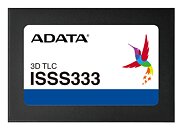Thursday, February 20th 2020

ADATA Launches ISSS333 Solid State Drives with Power Loss Protection
ADATA Technology, a leading manufacturer of high-performance DRAM modules and NAND Flash products, is pleased to announce the launch of its new 2.5-inch SATA III ISSS333 PLP 3D TLC solid state drives (SSD) featuring Power Loss Protection (PLP). The industrial-grade SSDs are purpose made for applications that require durability, reliability, and high capacities, including industrial computing, embedded applications, surveillance systems, medical equipment, gaming machines, defense applications, and general automation. ISSS333 PLP SSDs implement 3D NAND Flash and the SATA III 6 Gb/s interface for superb transfer rates of up to 560/520 MB per second. For cost savings, these SSDs sport lower power consumption of 2.3 watts.
Equipped with Power Loss Protection, ISSS333 3D TLC PLP SSDs guard against data loss when a sudden power failure occurs. This capabilities comes in handy for applications that are more prone to power outages, namely those operating in outdoor environments, such as base stations, surveillance systems, and transportation facilities to name a few. What's more, ISSS333 3D TLC PLP SSDs also feature wide-temperature resistance (-40°C to 85°C) to ensure optimal operation even in the harshest environments and polymer capacitors with short circuit protection. ISSS333 3D TLC PLP SSDs also support LDPC (Low-Density Parity-Check) error correcting code technology to detect and fix a wider range of data errors for more accurate data transfers and a longer SSD lifespan.Enhance Durability and Security
ADATA ISSS333 3D TLC PLP SSDs are rated for 3000 P/E cycles, which means their endurance, reliability, and stability are up to par with 2D MLC SSDs. What's more, for added reliability and improved cost efficiency, the SSDs implement the company's proprietary A+SLC technology. It utilizes custom NAND Flash firmware with an A+ sorting algorithm to emulate SLC performance. A+SLC is highly reliable, provides excellent data integrity, and delivers a superb cost/performance balance. ISSS333 3D TLC PLP SSDs also undergo ADATA's SSD validation process, covering functionality testing and reliability validation.
Larger Capacities for the 5G Era
With the growing prevalence of big data analytics, artificial intelligence, the Internet of Things, and the larger amounts of data and higher levels of connectivity associated with 5G deployment, higher capacity SSDs are becoming the norm. To meet these demands, ISSS333 3D TLC PLP SSDs sport capacities from 64 GB to 2 TB.
Wealth of Added Features
For added stability and reliability both SSDs support a number of technologies including Self-Monitoring, Analysis and Reporting Technology (S.M.A.R.T.), which can indicate a possible imminent drive failure, and NCQ and Windows TRIM Command to boost performance. For convenient management of the SSDs, customers can take advantage of ADATA's SSD Toolbox, which facilitates the monitoring and managing of the drives, with drive status, wear level, and lifespan information.
Exact availability of ADATA ISSS333 PLP SSDs may vary by region.
Equipped with Power Loss Protection, ISSS333 3D TLC PLP SSDs guard against data loss when a sudden power failure occurs. This capabilities comes in handy for applications that are more prone to power outages, namely those operating in outdoor environments, such as base stations, surveillance systems, and transportation facilities to name a few. What's more, ISSS333 3D TLC PLP SSDs also feature wide-temperature resistance (-40°C to 85°C) to ensure optimal operation even in the harshest environments and polymer capacitors with short circuit protection. ISSS333 3D TLC PLP SSDs also support LDPC (Low-Density Parity-Check) error correcting code technology to detect and fix a wider range of data errors for more accurate data transfers and a longer SSD lifespan.Enhance Durability and Security
ADATA ISSS333 3D TLC PLP SSDs are rated for 3000 P/E cycles, which means their endurance, reliability, and stability are up to par with 2D MLC SSDs. What's more, for added reliability and improved cost efficiency, the SSDs implement the company's proprietary A+SLC technology. It utilizes custom NAND Flash firmware with an A+ sorting algorithm to emulate SLC performance. A+SLC is highly reliable, provides excellent data integrity, and delivers a superb cost/performance balance. ISSS333 3D TLC PLP SSDs also undergo ADATA's SSD validation process, covering functionality testing and reliability validation.
Larger Capacities for the 5G Era
With the growing prevalence of big data analytics, artificial intelligence, the Internet of Things, and the larger amounts of data and higher levels of connectivity associated with 5G deployment, higher capacity SSDs are becoming the norm. To meet these demands, ISSS333 3D TLC PLP SSDs sport capacities from 64 GB to 2 TB.
Wealth of Added Features
For added stability and reliability both SSDs support a number of technologies including Self-Monitoring, Analysis and Reporting Technology (S.M.A.R.T.), which can indicate a possible imminent drive failure, and NCQ and Windows TRIM Command to boost performance. For convenient management of the SSDs, customers can take advantage of ADATA's SSD Toolbox, which facilitates the monitoring and managing of the drives, with drive status, wear level, and lifespan information.
Exact availability of ADATA ISSS333 PLP SSDs may vary by region.

5 Comments on ADATA Launches ISSS333 Solid State Drives with Power Loss Protection
Perhaps it was meant to instill confidence in the businesses that collect, store, use, sell, and profit from our data.... n.O.t :mad:
Adata already has the consumer market covered with a great selection of drives that offer great performance at reasonable prices, so I'm trying hard to understand why this was even posted here.... perhaps TPU is set on becoming a shrill site for commercial/industrial-related businesses/products ?
Power loss protection is a great feature, however, unless/until it reaches us without a price-gouge premium, it will most likely not be sought after by most folks here.
It wasn't my intention to offend anyone (I'm too old to really care about that anyways), but my point still stands :p
And finally, for me personally, spinning platters have been dead & done for many years, regular SATA SSD's will soon follow them, and flash storage is the future, at least in the near term anyways....